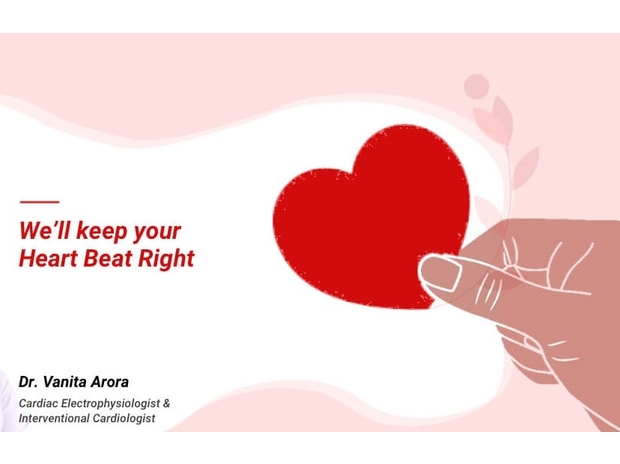
 November 29, 2020 | 10 mins read time
November 29, 2020 | 10 mins read timeAward-winning cardiac electrophysiologist, Dr. Vanita Arora, shares how COVID-19 can affect the heart, what precautions heart patients need to take, and the effect of lockdown stress on the heart in times of social distancing.
Since the onset of the COVID-19 pandemic, everyone has their guard up in more ways than one. People have started to take health more seriously and take up lifestyle changes for the better.
There is still a lot to know about COVID-19 and its effect on humans. While it is known that the virus can affect the lungs and bring about adverse complications, many are unaware of the detrimental effects the SARS-CoV-2 virus on our body’s most vital organ – our heart.
Those with pre-existing heart conditions have to be doubly cautious as COVID-19 is known to affect them more adversely.
Dr. Vanita Arora, DNB Cardiology, MD Medicine - the first female cardiac electrophysiologist in India - says that people with chronic medical conditions and existing heart issues may have a less robust immune system. And therefore, their body’s immune response may not be as strong as normal individuals when exposed to the COVID-19 virus.
Patients with diabetes mellitus, hypertension, obesity, coronary artery disease and other pre-existing co-morbidities are at a higher risk. But any COVID-19 positive patients can develop cardiac issues such as heart attack, angina, pulmonary embolism, rhythm problems, and myocarditis says Dr. Vanita Arora.
She adds that there is a higher likelihood of complications with those with pre-existing coronary artery disease as COVID-19 can cause a hypercoagulable state. This can lead to an increase in the formation of clots on existing blockages or throw microemboli.
While the necessary precautions like frequent hand washing, physical distancing, and wearing masks are of utmost importance, there also needs to be monitoring of blood pressure, oxygen saturation, and pulse rate on a regular basis.
Patients with implanted devices should try and make the best use of remote monitoring and get their implanted devices, such as pacemakers, monitored regularly. This is known as programming of the pacemaker. For this, the patient need not visit the clinic and risk himself/herself to unnecessary exposure. Remote monitoring skips the need for a hospital visit as the patient can send the data from the device to the doctor via the internet.
Due to the lockdown, an increasing number of individuals are experiencing stress and having negative thoughts. This kind of stress and negativity is not good, especially for the heart. In such trying times, it is very important to stay calm and be in a positive frame of mind.
Breathing exercises and yoga in the mornings can help reduce stress levels. Though physically distant, keep maintaining your social network on a remote basis and continue to communicate with your family and friends as regularly as you can.
Dr. Vanita Arora (DNB Cardiology, MD Medicine) is the Director and Head of Cardiac Electrophysiology Lab and Arrhythmia Services at Max Healthcare Superspeciality Hospital, Saket, New Delhi. In an illustrious medical career spanning more than two decades, her pioneering ways have won her prestigious awards like ‘Rising Star in Cardiology’, ‘Woman Doctor Entrepreneur of year 2018’, ‘Chikitsa Ratan’ along with several other accolades. She was the first in the entire Asia Pacific to carry out the Live Case of a leadless pacemaker at the TCT India conference held in 2016.
Promoted by Fix Me Digitally